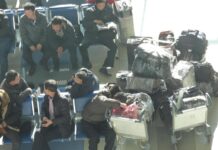[imText1]At a forum sponsored by the Network for North Korean Democracy and Human Rights (NKnet) called “The Kaesong Industrial Complex and the Direction of the South Korean Government’s North Korea Policy,” South Korean experts maintained that the South Korean government has to approach the operations of the Kaesong Industrial Complex from a strictly economic rationale, and may even have to consider the possibility of abandoning the Complex altogether.
Lee Soo Suk, the Institute for National Security Strategy’s Inter-Korea Relations Research Chief pointed out, “The Kaesong Complex, which symbolizes conciliatory cooperation between the two Koreas, could become a means for causing a stalemate in inter-Korean relations and destabilizing the state of affairs on the Korean peninsula.”
Lee looked back, “When reflecting on North Korea’s actions, which have caused a rift in inter-Korea relations since last year, North Korea’s anti-Kaesong Industrial Complex policy could be expected. North Korea has also resolutely maintained that abandoning the Complex is a possibility.”
He forecasted, “North Korea, by elevating the threat level in inter-Korea relations, will try to exacerbate tensions with South Korea. If North Korea does not immediately indict and refer the trial of the Hyundai Asan employee Mr. Yoo, then the issue will be dragged out and North-South Korea relations will worsen.”
Also, “Even if the South agrees to what North Korea wants in inter-Korea relations, it will not help promote dialogue. Even if it focuses all of its energy on ensuring that the Complex is not abandoned, it must give thought to such a possibility and prepare to at least partially compensate the South Korean companies for their losses.”
“The weakness of the Kaesong Complex in inter-Korea relations is the virtual separation of the Kaesong Complex from the general North Korean economy. When forming the business conditions of the Kaesong Complex hereafter, a policy must be pursued which allows North Korea to bear as much of the damage as us if the Complex is abandoned,” he suggested.
Kim Gyu Chul, the Forum for Inter-Korea Relations Representative, also insisted, “In subsequently dealings with North Korea, the South Korean government must choose an approach based on economic rationale and, if this is not feasible, then the Complex must be abandoned in order to minimize the damage to the companies or large corporations that are stationed there.”
In particular, he described, “The Kaesong Complex has been packaged as a symbol of reconciliation and cooperation under the June 15th Joint Declaration, but in reality, North and South Koreans only work under the same roof and must be separate during meals and breaks. If a North Korean worker seems too friendly with a South Korean employee, then s/he can incur a penalty.”
He added, “The exterior of the factories and the facilities are top-of-the-line, but the actual method of operation is old-fashioned; the use of internet or cell phones is not allowed inside the Complex. The North Korean Guidance Bureau has only fostered instability by toughening regulations rather than supporting the companies that are based there.”
Oh Kyoung Sup, a researcher at the Sejong Research Institute, pointed out, “Through recent events, the fact that inter-Korean economic cooperation such as the Kaesong Complex can be used as a political and military threat by the North Korean regime has been confirmed. Also, the situation has shown that that hopes that the North Korean regime would reform and open through the expansion of inter-Korea economic cooperation is misplaced.”
He maintained, “As long as political change does not take place in the North Korean regime, the situation surrounding the Kaesong Complex can be used as a means for readjusting the principles and speed of inter-Korea economic cooperation. In the midst of a situation where it is difficult to place confidence in the North Korean regime, then South Korea must refrain from investing further in inter-Korean economic cooperation projects.”
On one hand, Cho Myung Chul, a senior researcher at the Korea Institute for Economic Policy, upheld, “The recent situation has carved out the need to prepare for North Korea’s failure to keep its promises in inter-Korea economic cooperation. If small companies go into the Complex short-term, then they will inevitably be dragged around by the North, so it is better to cooperate with the North by investing in the country or by focusing on large corporations or public enterprises.”
He explained, “Large corporations and public enterprises have capital so they will not be overly attached to small investments in North Korea and can take drastic actions such as evacuation if North Korea does not keep its end of the bargain. This will also serve as the greatest incentive to North Korea.”

















